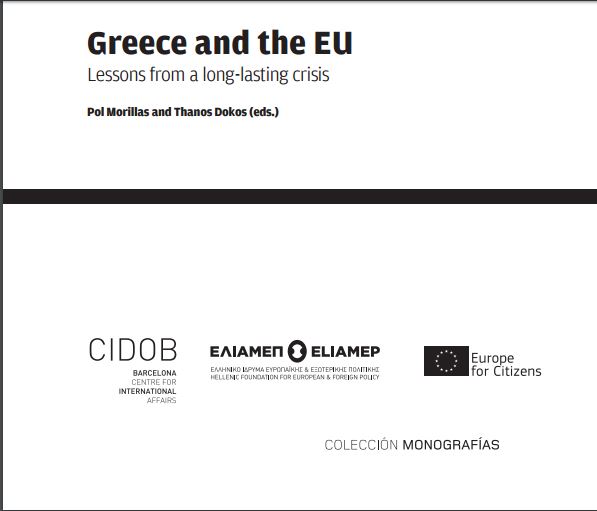Ματσαγγάνης, Μάνος, Λεβέντη, Χρύσα, Καναβιτσά, Ελένη, Φλεβοτόμου, Μαρία, (2016), “Μια Αποδοτικότερη Πολιτική για την Καταπολέμηση της Ακραίας Φτώχειας”, ΔιαΝΕΟσις, Ιούνιος Τι είναι η φτώχεια; Ποιος είναι φτωχός; Ποιο είναι το αληθινό πρόσωπο του προβλήματος στην Ελλάδα, και πώς έχει επηρεαστεί από την οικονομική κρίση των τελευταίων χρόνων; Για να αναλύσει τη φύση και το μέγεθος του προβλήματος, και για να καταλήξει στη διατύπωση συγκεκριμένων προτάσεων αντιμετώπισής του, η διαΝΕΟσις διεξήγαγε μια διπλή έρευνα. Αυτή …Read More
Greece and the EU. Lessons from a Long-lasting Crisis
Pol Morillas, Thanos Dokos, (2016), “Greece and the EU. Lessons from a Long-lasting Crisis”, CIDOB Monographs, Μάϊος Less than a year ago, the Greek crisis reached its highest level of tension. After arduous negotiations, the Greek government and its creditors signed the agreement for a third bailout in July 2015,which should provide liquidity to the Greek public sector in return for a severe programme of deficit adjustment and structural reforms. At …Read More
Greece : Preliminary Debt Sustainability Analysis-Updated Estimates and Further Considerations
IMF, “Greece : Preliminary Debt Sustainability Analysis-Updated Estimates and Further Considerations”, Country Report No. 16/130, 23 Μαϊου Greece continues to face a daunting fiscal consolidation challenge. After seven years of recession and a structural adjustment of 16 percent of GDP, Greece has only managed to achieve a small primary surplus in 2015, and this due to sizeable one-off factors. This is still far away from its ambitious medium-term primary surplus target of …Read More
The ECB grants debt relief to all Eurozone nations except Greece
De Grauwe, Paul, (2016), “The ECB grants debt relief to all Eurozone nations except Greece”, Voxeu, 13 Μαΐου Greece may be about to get some debt relief, although there is still resistance to the idea. This column argues that the ECB has been providing other Eurozone countries with debt relief since early 2015 through its programme of quantitative easing. The reason given for excluding Greece from the QE programme – the ‘quality’ …Read More
Political budget cycles and reelection prospects in Greece’s municipalities
Chortareas, Georgios, Logothetis, Vasileios, Papandreou, Andreas A., (2016), “Political budget cycles and reelection prospects in Greece’s municipalities”, European Journal of Political Economy, Μάιος This paper considers the presence of political budget cycles in Greece’s municipalities. We construct a new dataset from primary sources and we find strong evidence of pre-electoral manipulation through increased expenditures and excessive borrowing. We use a dynamic panel data approach producing evidence of opportunistic behavior in local government …Read More
Greece in a monetary union: Lessons from 100 years of exchange rate experience, 1841-1939
Morys Matthias, (2016), “Greece in a monetary union: Lessons from 100 years of exchange rate experience, 1841-1939”, Voxeu, 10 Μαΐου The first century of modern Greek monetary history has striking parallels to the country’s current crisis, from repeated cycles of entry and exit from the dominant fixed exchange rate system, to government debt built-up and default, to financial supervision by West European countries. This column compares these two episodes in Greece’s monetary …Read More
Where did the Greek bailout money go?
Rocholl, J., and A. Stahmer (2016), “Where did the Greek bailout money go?”, ESMT White Paper No. WP–16–02 This paper analyzes the flow of money for the different Greek bailout funds and concentrates on two key questions. First, where did the money come from? Second, where did the money go to? Finally, the paper discusses the findings in a broader context and derives policy implications. Figure 1 presents the main …Read More
Is Greek public debt unsustainable?
Darvas, Zsolt, Hutl, Pia, (2016), “Is Greek public debt unsustainable?”, Bruegel, 7 Μαϊου Greek public debt does not look sustainable if the country has to return to market borrowing at the end of the third bail-out programme, but could be sustainable if preferential ESM funding continues in the long-term. Our advice is to offer hope for Greece in the form of delayed fiscal adjustment toward a target of 2.5% of …Read More
Η έξοδος των ελληνικών επιχειρήσεων
Endeavor Greece, (2016), “Η έξοδος των ελληνικών επιχειρήσεων”, Endeavor, 5 Απριλίου Η Endeavor Greece, διεθνής μη κερδοσκοπικός οργανισμός στήριξης της επιχειρηματικότητας, καταγράφει την τάση των ελληνικών επιχειρήσεων για μεταφορά της έδρας ή μέρους της δραστηριότητάς τους στο εξωτερικό. Η έρευνα διεξήχθη σε δείγμα 300 επιλεγμένων επιχειρήσεων διαφόρων κλάδων και μεγεθών κατά το διάστημα 23-31 Μαρτίου. Σύμφωνα με τα ευρήματα της έρευνας, 39% των επιχειρήσεων εξετάζουν το ενδεχόμενο μεταφοράς της έδρας τους …Read More
Time for Debt Reduction in Greece
El-Arian, Mohamed A., (2016), “Time for Debt Reduction in Greece”, Project Syndicate, 22 Απριλίου Once again, Greece is at an inflection point. With its cash balances severely stressed, it seems unlikely to be able to pay the cascading debt payments that are falling due over the next few months. So yet another round of contentious and protracted discussions with its creditors is underway – one that may well produce yet another …Read More






